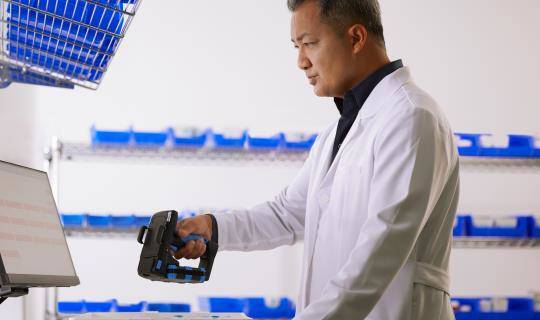Article: The Impact of Lockdown and Restrictions on COVID-19 Treatment Trials
By AmerisourceBergen
Development and trials of treatments for COVID-19 are progressing at pace. Many efforts are already – after only a few months – at a stage that would ordinarily take two or three years to get to.
Meanwhile, lockdown measures and other restrictions
essential for slowing the rate of infection have made delivering treatments more
challenging than ever. For reaching patients, yes, but also for running the
trials necessary to confirm a medicine’s efficacy – particularly in the
hardest-hit regions most suitable for large-scale testing.
In more ordinary times, logistics tend to be
considered relatively late in the research and development process. While speed
is of the utmost importance, the additional complexity the global pandemic has
introduced into supply chains means robust distribution networks must be put in
place at the first sign of a treatment’s viability.
Three major challenges must be prepared for:
constantly shifting travel restrictions, maintaining shipment integrity in the
face of those restrictions, and ensuring trial data can be relied upon.
Planning for Change
Travel restrictions have loosened. But they are
constantly changing on a country-by-country basis. The only way to plan for
such complexity is to prepare to pivot at a moment’s notice. Alternative routes
and methods must be evaluated frequently. Customs and regulations must be
negotiated in real time to facilitate the consignment’s journey.
In one Middle Eastern country, the first COVID-19
patient was a healthy young bus driver. At the time, the manufacturer of an
existing drug known to minimize the effects of the virus contacted World
Courier. They asked us to find a way to ship their treatment to him despite
stringent border controls and air space restrictions.
We usually dispatch low-volume shipments on commercial
flights, but these were grounded. Instead, we put the drug on a cargo plane and
organized an associate to take delivery in the middle of the night and drive it
to the hospital. The bus driver received the treatment within 24 hours of us
receiving the call. He is now fully recovered.
Having established this route, we followed it for
several more patients. But when even freight planes stopped flying, we
negotiated for the country’s military to take consignments over the border from
the country of origin.
Maintaining Shipment Integrity
Many drugs must be stored within a specific
temperature range if they are to remain effective. That applies in transit as
much as anywhere else.
While it is essential to prepare to switch routes
with little warning, it is just as important that alternative routes don’t
result in a temperature excursion. The first step is using the right packaging. Nils Markmann, VP Operations, World Courier, explains:
“To maintain a cold chain at, say, -80°C, we must use shippers [specialist packaging] engineered with insulated material. These are rigorously tested against industry standards and subjected to a real-world test shipment with the product inside before being deployed. We don’t take any chances.”
The tests also reveal how long packaging can
reliably maintain its temperature. This time must be factored in to alternative
routes, ensuring facilities are available for intervention should there be any
delays. Coolants may need replenishing. Cryo-shipments – that typically use
liquid nitrogen to cool below -150°C – require handling by highly trained personnel.
Refrigerated storage may be needed while customs paperwork is handled.
Without these qualified GDP facilities, consignments
may arrive intact, but outside of temperature range – and unable to to be
administered as a result.
Ensuring Reliable Data
Maintaining cold chain custody is just as important
for collecting reliable trial data. Without a verifiable log of each dose’s
temperature, any variation in performance could be due to temperature
excursions experienced in transit.
That’s one reason why, Markmann explains, “We place
a temperature logger inside each shipper to track and document the temperature
of the product through the entire journey.” The data can be viewed in real-time
for critical IMP (Investigational Medicinal Products) – enabling immediate
intervention if needed – or reviewed at a later date.
By integrating this stream with native data
platforms, the temperature log can form part of the trial record for
confirmation that temperature excursions aren’t impacting results data. At the
very least, transport incidents can be ruled out as a cause of anomalous
results, supporting the integrity of the trial.

Dependable Distribution is Crucial for COVID-19 Treatment Trials
As trials for COVID-19 treatments move at pharmaceutical
lightspeed, it is vital that speed does not come at the cost of logistical
quality – otherwise the pace will count for nothing. Delays and excursions can
render consignments useless; at worst losing lives, at best corrupting trial
data and prolonging the wait for widely available therapies.
If we are to deploy viable treatments as fast as
they’re needed, as much attention must be paid to the logistics of distribution
as to the clinical aspects of developing these drugs. Especially given the
challenging circumstances of delivering consignments in an erratic global
lockdown. A focus on logistics quality now will yield far greater value down
the line, by virtue of minimizing errors.
World Courier has a global network of associates,
with detailed, local knowledge, that enables us to pivot at speed, while still
maintaining cold chain integrity. 99.9% of consignments we carry are delivered
without incident.
To find out more about how we’re supporting COVID-19
clinical trials – and the distribution of approved therapies – visit our COVID-19 resource hub. To discuss how we
can support your trial, get in touch today.




